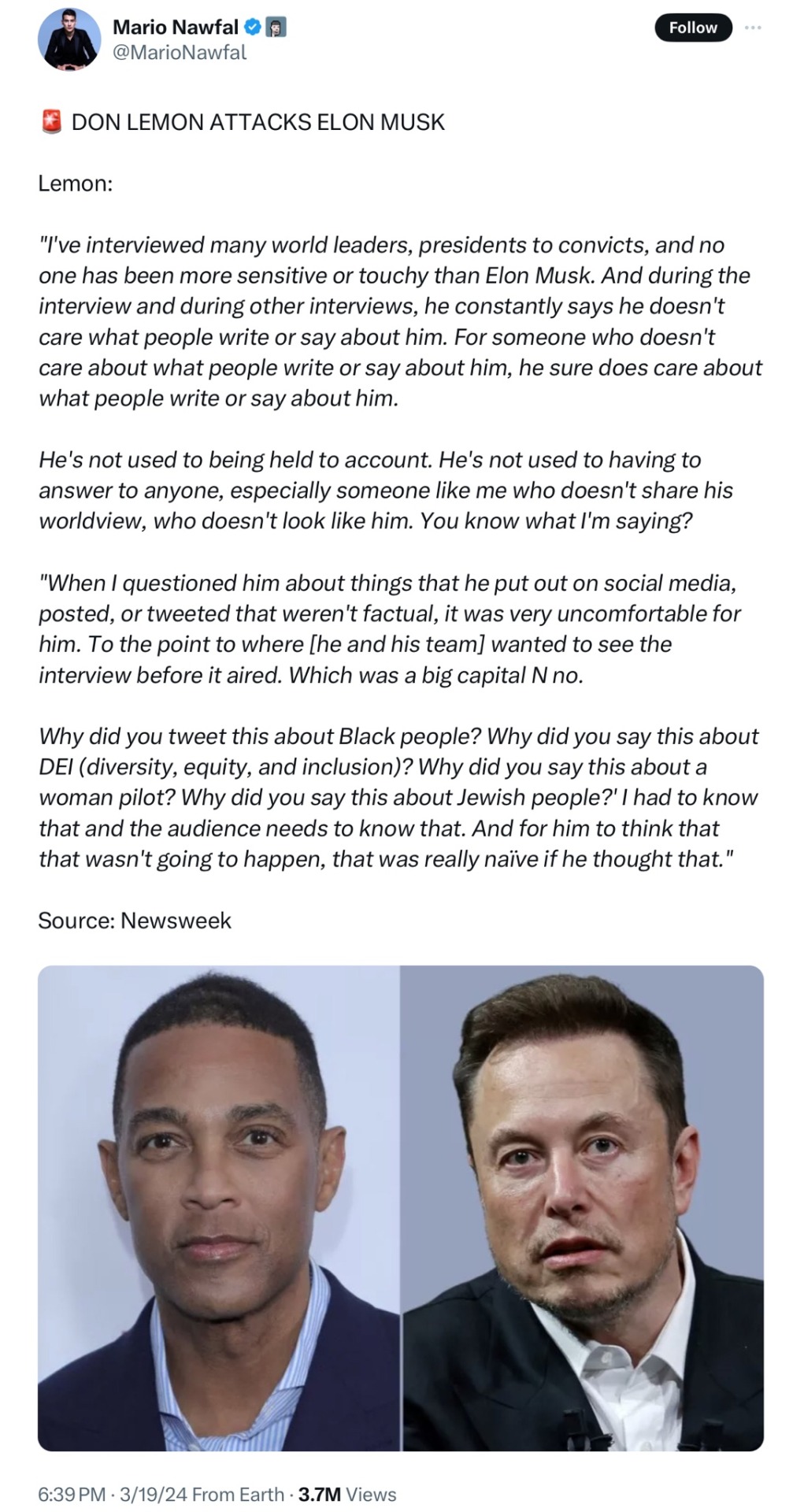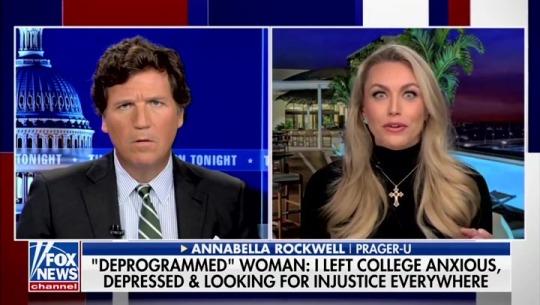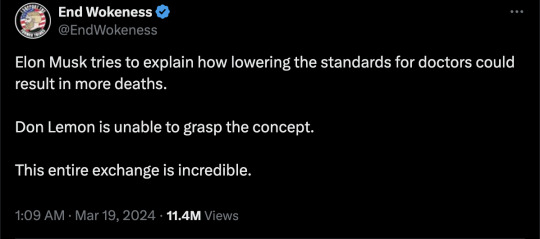#don lemon
Text

30K notes
·
View notes
Text


648 notes
·
View notes
Text

#don lemon#elongated muskrat#oligarch asshole#republican assholes#Republican propagandist#corporate greed#X/Twitter is run by a Neo-Nazi#Trump sycophant#maga morons
127 notes
·
View notes
Text
Want to see the Forbidden Interview that got Don Lemon's twitter show axed? The interview that Elon paid for? The interview that Elon asked Don Lemon to conduct, that was to launch twitter's entry into serious video hosting to destroy youtube & tiktok?
The video that makes Elon look like the raving asshole he really is?
The video that Elon wouldn't release on twitter?
THAT video?
Of course you do.
94 notes
·
View notes
Text
Ex-CNN Anchor Presses Billionaire On Claims About Lower Standards For Female And Minority Pilots
Former CNN anchor and now ex-X talk host Don Lemon, released yet another segment of his sit-down interview with X owner Elon Musk today, with the clip showing Lemon pressing Musk about the latter’s claim that the airline industry has lower standards for female and minority pilots than for white male pilots.
Appearing on ABC’s The View today to tout his upcoming, now-YouTube series The Don Lemon Show, Lemon brought along the new interview clip that features a persistent Lemon questioning a seemingly flustered Musk about the pilot issue.
Lemon points out that, after a door-sized panel blew off of an Alaska Airlines/Boeing jet mid-flight, the female pilot landed the plane safely and without further incident.
Musk has repeatedly tweeted and amplified others’ tweets that “DEI” – Diversity, Equity & Inclusion – is being prioritized by the airline industry over safety.
In the clip of the show, set to debut Monday on YouTube and other platforms, Lemon asks Musk, “Do you believe that women and minority pilots are inherently less intelligent and less skilled than white male pilots?”
“No,” Musk replies, “I’m just saying we should not lower standards for them.”
“But,” says Lemon, “there’s no evidence that the standards are being lowered when it comes to the airlines…”
“Ok, you’ve repeatedly said that there’s no evidence that the standards are being lowered,” replies Musk. “Then watch the replies showing all evidence that it is.”
“Replies on social media and twitter are not necessarily fact and evidence,” Lemon says.
(continue reading) related ↵
#politics#elon musk#don lemon#racism#antisemitism#twitter#great replacement theory#dei#elon musk is a racist#misogyny#apartheid clyde#eugenics musk#techno grifters#cryptobros
55 notes
·
View notes
Text

313 notes
·
View notes
Text
224 notes
·
View notes
Text










Lost in all this news: the pandas got some justice.
These headlines are real by the way.
#Rape tw#tucker carlson#pandas#news#don lemon#fox news#trans#transgender#liberals#united states#trump#maga#tucker#humor
571 notes
·
View notes
Text
youtube
Such a good speech! Roy Wood Jr at the 2023 WHCD.
#roy wood jr#president joe biden#vice president kamala harris#white house#brittney griner#tucker carlson#don lemon#Youtube
85 notes
·
View notes
Text



and this is why don lost his show on x. he embarrassed elon with a real interview. not some ass kissing, softball questions with no follow up. an actual strong, fact based, confident interview by a real journalist. i've always said that elon could never hold up to a real interview. this was light work to be honest. you think elon would survive an interview by michael harriot, jemele hill, or mehdi hasan? he would melt like a snowball in hell under that kind of pressure and questioning lmsoo
196 notes
·
View notes
Text
My favorite clip from the Don Lemon and Vivek Ramaswamy segment that probably got Don Lemon fired from CNN
55 notes
·
View notes
Text
Man, watching this video... Elon is a tool. I'd read that it goes off the rails about halfway through, but that he seems pretty okay up until then. But I'm maybe 1/3 in and already:
lies about meeting Trump
"I just ran into him at a friend's house"
Trump didn't talk with him about anything in particular
admits to ketamine use
denies using weed or alcohol
calls CNN a leftist organization
considers twitter x.com to be more liberal than right(!!!)
denies endorsing republicans
This is amazing. The guy either lives in a high-vacuum bubble of unreality OR he's lying through his face.
25 notes
·
View notes
Text


By: Apunaja
Published: Mar 19, 2024
I just watched this clip of Don Lemon interviewing Elon Musk, where Lemon pushed back on Musk’s claims of DEI policies impacting the quality of medical care and insisted that there is no evidence that standards are being lowered in medical programs in the pursuit of diversity goals. It was infuriating to watch. The word ‘gaslighting’ repeatedly came to mind.
I don’t know if Lemon genuinely doesn’t know the facts about this issue, or if he is deliberately misrepresenting the inconvenient truth, but as anyone who has been paying attention to this issue can attest, it is indisputable that standards are indeed being lowered, in myriad professional and educational contexts, for the express purpose of increasing the racial diversity of that group’s membership. What makes it hard to believe that Lemon isn’t being disingenuous about this is that in so many of the cases where this is happening, the proponents of the policy openly state that the reason they are changing their standards are in order to increase representation of minorities. Of course, they don’t call it “lowering standards for diversity”. But when you get rid of a testing requirement, or lower the passing grade, or modify the entrance qualifications to deliberately allow lower performing black and Hispanic students entrance, you are by definition lowering standards for the sake of diversity and equity, no matter how you spin it.
It’s high time for the false claim that ‘promoting DEI doesn’t adversely impact standards’ to finally be put to rest. In the interview, Lemon said he looked forward to people providing evidence of the claim, so I’m going to attempt to do that here, to lay out unambiguous evidence of educational and professional standards being compromised for the sake of DEI. I’m going to first focus on the area of medicine, which is what Lemon was specifically talking about, and then I’ll get into many other arenas where we can see this happening.
In a 2022 City Journal article, the esteemed Heather Mac Donald describes a required medical exam being altered (both in its subject matter and its grading) to allow for more students to pass:
At the end of their second year of medical school, students take Step One of the USMLE, which measures knowledge of the body’s anatomical parts, their functioning, and their malfunctioning; topics include biochemistry, physiology, cell biology, pharmacology, and the cardiovascular system. High scores on Step One predict success in a residency; highly sought-after residency programs, such as neurosurgery and radiology, use Step One scores to help select applicants.
Black students are not admitted into competitive residencies at the same rate as whites because their average Step One test scores are a standard deviation below those of whites. Step One has already been modified to try to shrink that gap; it now includes non-science components such as “communication and interpersonal skills.” But the standard deviation in scores has persisted. In the world of antiracism, that persistence means only one thing: the test is to blame.
…The solution … was obvious: abolish Step One grades. Since January 2022, Step One has been graded on a pass-fail basis.
Further in the article, she explores how med school entrance standards have been adjusted to increase the number of minority students entering even though their grades were far lower:
In 2021, the average score for white applicants on the Medical College Admission Test was in the 71st percentile… The average score for black applicants was in the 35th percentile—a full standard deviation below the average white score. The MCATs have already been redesigned to try to reduce this gap; a quarter of the questions now focus on social issues and psychology.
Yet the gap persists. So medical schools use wildly different standards for admitting black and white applicants. From 2013 to 2016, only 8% of white college seniors with below-average undergraduate GPAs and below-average MCAT scores were offered a seat in medical school; less than 6% of Asian college seniors with those qualifications were offered a seat, according to an analysis by economist Mark Perry. Medical schools regarded those below-average scores as all but disqualifying—except when presented by blacks and Hispanics. Over 56% of black college seniors with below-average undergraduate GPAs and below-average MCATs and 31% of Hispanic students with those scores were admitted, making a black student in that range more than seven times as likely as a similarly situated white college senior to be admitted to medical school and more than nine times as likely to be admitted as a similarly situated Asian senior.
Later on she recounts a further example of reducing standards to increase diversity at a top-tier institution:
The University of Pennsylvania medical school guarantees admission to black undergraduates who score a modest 1300 on the SAT (on a 1600-point scale), maintain a 3.6 GPA in college, and complete two summers of internship at the school. The school waives its MCAT requirement for these black students; UPenn’s non-preferred medical students score in the top one percent of all MCAT takers.
The article details many more examples of diversity efforts impacting the quality of the curriculum, admissions, faculty hiring, research funding, accreditation, publishing, and other aspects of the medical education arena. I strongly encourage you to read it in full here.
But where did all these changes stem from? A 2020 Quillette article reveals how these policies were a result of a long-running campaign to increase diversity:
…in 2009 the body that accredits medical schools, the Liaison Committee on Medical Education (LCME), touched off a parity panic across the med school landscape by issuing stern new guidance on diversity. In order to remain accredited, declared LCME, medical schools “must” have policies and practices in place that “achieve appropriate diversity.”
…In the wake of the LCME’s watershed edict, working groups were convened, budget line items were created, and high-profile hires were made to facilitate diversity boosting and community recruitment. A main stumbling block seemed to be minority candidates’ poor performance on gatekeeper exams like the MCATs.
Once the unstoppable force of diversity activism met the immovable object of disparate MCAT scores, activists focused their efforts on reducing the MCAT’s significance and incorporating tests that were not based on cognitively demanding subjects like actual medical knowledge in favor of things like emotional intelligence, empathy, and communication:
The primary selling point of SJTs was thus that they allowed schools to consider factors other than such blind metrics as a straightforward ranking of applicants’ college grades and MCAT performance. The MCATs themselves were revised in 2015 to give meaningful weight to areas of the social sciences.
The amazing thing about all this is how, if you just listen to their own words, these activists are totally open about how they need to lower the standards to increase minority representation. Here’s one such statement from an advocacy group admitting that expecting minority students to meet the same academic standards everyone else is held to holds back diversity:
…a huge obstacle to diversity is that most medical schools have the same criteria for all applicants. To get a medical student population that is representative of the general population requires more than simply accepting applicants of color who have the same grades and MCAT scores as White applicants…
Their solution? Lessen the importance of the MCAT in applications.
While on the topic of medical schools, consider this chart, highlighting the likelihood that students in different racial groups are granted entrance to medical schools, based on their grades. It echoes Mac Donald’s claims above, and indisputably reveals that a low performing student has a much higher chance of getting in when they’re black versus being any other race.

Another way of looking at that same data is in this chart:

This 2023 Newsweek op-ed unambiguously advocates for the MCAT to be abolished as an entrance requirement in order to increase diversity:
A panel representing the American Bar Association (ABA) recently voted to eliminate the LSAT as an admissions requirement for law schools. The main reason for doing this: to increase diversity in law schools.
The Association of American Medical Colleges (AAMC) should follow the lead of the ABA for medical school admissions by removing the Medical College Admission Test (MCAT) as a requirement.
Here’s a similar Washington Post piece proposing that the MCAT be changed to a pass/fail test. Why? In the author’s own words: “This is a crucial step if the medical profession is to diversify its physician ranks.”
There are further examples that could be provided, but I think this suffices to prove Elon’s claim. Copious examples of deliberate efforts to lower standards in medical education for the express purpose of increasing diversity. Mr. Lemon, do you find this evidence sufficient to acknowledge that Elon’s assertion was correct?
But it gets worse. As I said above, the problem of lowering educational and professional standards to increase diversity is not just an issue in the medical field. Campaigns pursuing this agenda are occurring all over society. Mr. Lemon, please bear with me a bit longer and allow me to provide further evidence of just how widespread this phenomenon actually is:
1. In Oregon, the state decided that students don’t need to prove mastery of reading, writing or math to graduate, citing harm to students of color. This a result of a law passed in 2021 which the governor’s office explained as follows:
…suspending the reading, writing and math proficiency requirements while the state develops new graduation standards will benefit “Oregon’s Black, Latino, Latina, Latinx, Indigenous, Asian, Pacific Islander, Tribal, and students of color.”
2. In order to address "racial disparities" and "inequities" in grading, Portland Public Schools are trying "equitable grading practices" that bar teachers from assigning "zeros" to students who cheat or fail to turn in assignments.
3. In Minnesota, they’ve decided to stop giving F grades in order to “end systemic racism”.
4. In San Diego, because too many minority students were failing compared to white students, the school decided to address the problem not by improving the pedagogy but by… changing how they graded students. “The grading changes are part of a larger effort to combat racism,” they explained.
5. NJ chose to lower the minimum passing score on the state’s high school graduation test. Why? Among other reasons given was this appeal to diversity:
One board member who supported lowering the passing score suggested that it was “unfair” to “Black and Latino students” to require underperforming students to demonstrate a higher level of proficiency in reading and math before graduating.
6. In Arizona, a student dean felt that it would “promote equity” if he stopped grading students essays based on the quality of their writing. (This sounds similar to an effort by a student org that called for ‘Black Linguistic Justice’ and demanded that they not be graded by the standards of ordinary English, what they referred to as ‘white linguistic supremacy’. 🤷♂️)
7. Along similar lines, Rutgers decided to deemphasize traditional grammar ‘in solidarity with Black Lives Matter’.
8. It’s not just the US embracing this insanity. In the UK, instructors at Hull University were told to overlook students’ grammatical errors as part of an “inclusive marking policy”. And for a similar reason, the University of the Arts in London has told its staff to ‘actively accept spelling, grammar or other language mistakes that do not significantly impede communication’.
9. Please read this detailed article at The Free Press about the new California math initiative that sacrifices mathematical education for diversity goals. This new framework seems primarily motivated by concerns that too many students are sorted into different math tracks based on their natural abilities, which leads some to take calculus by their senior year of high school while a disproportionate number of black and Latino kids don't make it past basic algebra. So their solution is to prohibit any sorting until high school, keeping gifted kids in the same classrooms as their less mathematically inclined peers until at least grade nine.
10, Those same lowered math standards are being implemented in Cambridge, MA:
Udengaard is one of dozens of parents who recently have publicly voiced frustration with a years-old decision made by Cambridge to remove advanced math classes in grades six to eight. The district’s aim was to reduce disparities between low-income children of color, who weren’t often represented in such courses, and their more affluent peers.
11. In order to advance their DEI agenda, the creators of the bar exam are changing the famously difficult tests that lawyers have to pass before they are allowed to practice. How are they doing so? In their own words (emphasis added):
…we take seriously the need to work toward greater equity in all that we do as a testing organization, and we actively work to eliminate any aspects of our exams that could contribute to performance disparities among different groups.
A WSJ article investigating these changes reports:
Based on the diversity workshop at the NCBE conference, it means putting considerable emphasis on examinees’ race, sex, gender identity, nationality and other identity-based characteristics. The idea seems to be that any differences in group outcomes must be eliminated—even if the only way to achieve this goal is to water down the test. On top of all that, an American Civil Liberties Union representative provided conference attendees with a lecture on criminal-justice reform in which he argued that states should minimize or overlook would-be lawyers’ convictions for various criminal offenses in deciding whether to admit them to the bar.
12. Of course, the obvious question presents itself: why bother changing the bar exam to allow more people to pass it if you can just get rid of it entirely? And that’s exactly what some states are doing. Just a few days ago, the State of Washington decided to no longer require lawyers to pass the bar exam. Why? It was hampering diversity.
The Bar Licensure Task Force found that the traditional exam “disproportionally and unnecessarily blocks” marginalized groups from becoming practicing attorneys and is “at best minimally effective” for ensuring competency.
13. The Washington State decision follows in the footsteps of Oregon, which stopped requiring the bar exam last year.
14. Taking the bar happens at the end of a law student’s journey. What about at the beginning, when they are taking the LSAT? No worries, diversity initiatives are lowering the bar there too! The American Bar Association voted in 2022 to stop requiring the LSAT for admission to law school. Why?
“In the grand scheme of things, folks of color perform less well on the LSAT than not, and for that reason, I think we are headed in the right direction,” Leo Martinez, an ABA council member and dean emeritus at University of California, Hastings College of the Law, said at the meeting.
15. In related legal arenas, Delaware chose to improve the diversity of its legal community by instituting a few changes of its own. Some of the changes, “which ultimately aim to also increase the number of Black and Latino judges”, include lowering the passing grade, halving the number of essays, and other competency requirements being relaxed.
16. Similar changes have happened in California, for the explicitly stated reason of increasing diversity:The California Supreme Court, which oversees the state bar, agreed to lower the passing score for the exam, a victory for law school deans who have long hoped the change would raise the number of Black and Latino people practicing law.
17. A 2015 NY Times headline: Study Cites Lower Standards in Law School Admissions. Why are they lowering standards? Answer: “…they need flexibility in selecting students to assure a diverse population of lawyers.”
18. Just like with med schools, law school acceptance rates are biased towards minorities. An analysis of admissions data data revealed that being from an under represented minority group (URM) boosted one’s chance of acceptance to a law school quite dramatically:
Almost every school we cover shows an increased chance of admission to URM applicants, with higher boosts for higher-tiered schools….As you can see in Table 1a, law schools typically give a 7% boost to URM applicants. In other words, a URM applicant who is exactly equal to a non-URM candidate, including all other factors we control for, is 7% more likely to be admitted to any law school than a non-URM equivalent. This number is a whopping 498% in the Top 14, 126% in the Top 25, and 52% in the Top 50 law schools.
Just as is happening in the legal and medical arenas, the practice of increasing minority numbers by eliminating entrance exams that ensure professional competency is happening in other professions too. Some examples of that:
19. In Washington, DC, officials considered getting rid of their social work exam over concerns that it failed too many people of color.
20. A required test for math teacher certification in Ontario showed significant racial disparities in the success rates of those taking it. As a result of the disparity a court ruled it unconstitutional and teachers were no longer required to take it. (The ruling has since been overturned.)
21. A similar case occurred in NY whereby prospective teachers had to take an Academic Literacy Skills Test. But because disproportionate numbers of black and Hispanic applicants failed it, the test was eliminated.
22. In a similar lawsuit, NYC had to pay out $1.8 billion to former teachers who failed a certification test. Why? The test was deemed racially biased since a disproportionate number of the failures came from minority teachers.
23. In 2015 the FDNY was pressured to modify its certification requirements to increase gender diversity, and for the first time ever passed a woman who failed a physical test that until then all fire-fighter applicants needed to pass.
Fire Commissioner Daniel Nigro told a City Council hearing on the FDNY’s efforts to recruit women that he had changed FST requirements to lower obstacles.
24. A few months ago, a fascinating article appeared on this very platform exposing how the FAA deliberately lowered the testing requirements of flight controllers for the express purpose of increasing diversity. The consequences for the industry were, unsurprisingly, appalling:
A report on FAA hiring issues found that 70% of CTI administrators agreed that the changes in the process had led to a negative effect on the air traffic control infrastructure. One respondent stated their "numbers [had] been devastated," and the majority agreed that it would severely impact the health of their own programs.
25. Of course, a well-known area where standards have been lowered in the pursuit of DEI is in how colleges have stopped requiring applicants to have taken the SAT. I can’t begin to list all the colleges that have dropped the SAT entrance requirements in the name of equity (although many hid the decision behind the excuse of Covid), but according to this list, it’s over a thousand schools. A few prominent names that instituted the policy are Columbia, Yale, Princeton, Stanford, Harvard, MIT, UCLA, and SUNY. (However, in recent months, a few of those institutions have reversed the policy and now require it again.)
26. Among all the many cases where destructive DEI policies are being implemented, possibly the most disturbing arena of all is when actually talented and capable students are purposefully denied opportunities that can help them excel. An example of this in action is the numerous school districts that have chosen to remove “Gifted and Honors” classes for the stated reason of increasing equity. Some examples:
Culver City, CA:
Troy, MI
Barrington, RI
New York and this too
Seattle, WA
Vancouver, Canada
27. If they’re not eliminating the Honors programs entirely, many schools are simply dropping the entrance requirements so that they are open to anyone, thereby diluting their very purpose. Some places this has already happened:
San Francisco
Boston, MA
Montgomery County, MD
New York City
Fairfax, VA
The result of these admission changes? Massive increases in students failing. For example:
…at the John D. O'Bryant School of Mathematics and Science, just 50% of seventh graders met or exceeded expectations in math, down from 85% as recently as 2019. Nor was the Boston Latin School, the crown jewel of the system, immune: Just 70% of seventh graders either met or exceeded expectations in math, down from 94% three years ago.
28. Even the military is affected by demands to lower standards to increase diversity (albeit gender diversity, not racial). The Army actually removed a physical test because not enough women were passing it:
On Monday, the Army ended its requirement that soldiers do at least one leg tuck — where they hang from a bar and pull their knees up near their shoulders — as part of the new physical fitness test, as it became clear that many troops, particularly women, were unable to do it.
29. Speaking of gender diversity, Oxford University decided that because not enough women were passing their math and computer science examinations, they would add more time to the exam to help them. (Apparently, it didn’t even help.)
30. Oxford also decided to let a History test be taken at home in order to increase the number of women passing.
31. And because too many men were getting top grades in a classics course over the women, Oxford also decided they had to overhaul the entire course in order to bridge the gender gap.
32. Across the globe in Australia, the University of Technology Sydney chose to boost their gender diversity by allowing female students to enter its engineering and construction courses with lower grades than the males.
33. Back in 2016, a doctoral student at the University of North Dakota actually published a paper suggesting that STEM courses be made more inclusive of women by making then “less competitive,” so maybe that’s where the above universities got their inspiration from?
34. The lowering of educational standards for the sake of diversity is happening in arts education too. Consider how auditions were scrapped at a Brooklyn performing arts school in favor of a lottery. Why? Diversity!
The Department of Education says standards like auditions — or test scores and grades at other schools — block access for underprivileged kids, and the new policy will diversify student bodies across the district.
The above examples are just a sampling of the many instances of the pernicious trend of DEI deliberately compromising the standards of performance to advance its agenda. Public figures and pundits like Don Lemon need to stop repeating this lie that there is no downside to promoting these policies. On the contrary, it’s imperative that everyone recognize how these Harrison Bergeron-like policies directly lead to a deterioration of our educational outcomes, an undermining of our scientific, technological and medical progress, a diminishing of our professional competencies, and a fraying of our societal cohesion.
It’s time for DEI to DIE.
==
Don 🍋 is astonishingly dumb.
11 notes
·
View notes

